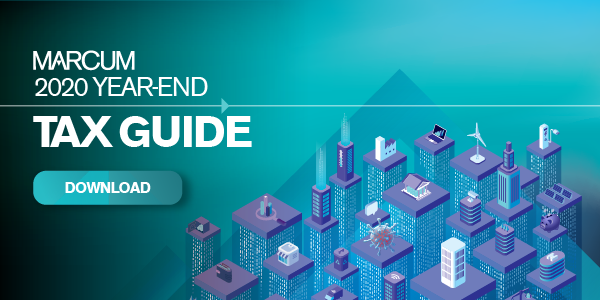Year-End Tax Planning for Construction Companies in Light of Biden’s Proposed Policy Changes
By Ashlie Forum, Partner, Tax & Business Services & Glendys Zuniga, Supervisor, Tax & Business Services
Tremendous uncertainty around year-end tax planning strategies is typical in election years, but perhaps more this year than ever before. With President-elect Joseph Biden’s inauguration in January 2021, significant considerations exist for the construction industry, especially for contractors who earn $400,000 or more per year.
Below is a comparison of several significant areas in Biden’s proposed tax policy as compared to current tax law, which are most likely to impact the construction industry.
Individual Taxes
Most contractors use a pass-through entity structures, such as S corporations and partnerships, in which business income passes through to the individual owner’s personal tax return, and the income is then taxed at individual income tax rates. The items noted below are some of the potential changes in tax policy for individual owners of pass-through entities.
Individual Tax Rates
Current Law – Seven tax brackets: 10%, 12%, 22%, 24%, 32%, 35%, and 37%
Biden Proposal – Top tax rate will revert from 37% to 39.6%, affecting contractors earning more than $400,000.
Itemized Deductions
Current Law – Itemized deductions currently are not phased out for higher income taxpayers; Pease limitation was suspended (defined below). The itemized deduction for state and local taxes, which includes real estate taxes and state and local income taxes, is capped at $10,000.
Biden Proposal – Cap on the itemized deduction benefit is to be set at 28%. Biden proposes reinstituting the Pease limitation affecting contractors earning over $400,000 and eliminating the state and local tax (SALT) cap of $10,000. The Pease limitation will reduce the contractor’s itemized deductions by 3% of income exceeding $400,000.
Planning Strategy
The typical tax planning for deferring income and accelerated deductions may differ in 2020 due to possibly increased tax rates. Contractors should consider the acceleration of income into 2020 to take advantage of a possible lower ordinary income rate. Roth conversions may be a mechanism to accelerate income. In addition, Biden’s tax plan causes itemized deductions to be more valuable in 2020 due to the 28% cap. For high-earning contractors, it may make sense to accelerate both income and certain itemized deductions, such as charitable contributions.
Business Taxes
Contractors who use a C-corporation entity structure currently pay a 21% tax rate. Contractors who use a pass-through entity structure (i.e., partnerships and S corporations) may be eligible for the qualified business income deduction. The QBI deduction was enacted in 2018 under the Tax Cuts and Jobs Act and allows for a 20% deduction of qualified business income. When the 20% deduction is maximized, it can reduce the tax rate for individuals in the top bracket from 37% to 29.6% on the contractor’s pass-through income.
C-corporation Tax Rates
Current Law – 21%
Biden Proposal – 28%
Qualified Business Income (QBI) Deduction
Current Law – 20% deduction of QBI for pass-through entities that qualify.
Biden Proposal – Contractors with incomes above $400,000 will no longer be able to take advantage of the 20% QBI deduction for pass-through entities.
Planning Strategy
As mentioned above, contractors should consider the acceleration of income into 2020 to take advantage of a possibly lower income rate. However, typical tax planning for deferring income and accelerating deductions may still apply where acceleration of deductions and deferral of income produces a net operating loss. NOLs in 2020 are eligible for a 5-year carryback.
Payroll Taxes
Contractors’ wages are subject to payroll taxes known as FICA, which is a combination of Social Security taxes and Medicare taxes. Social security tax is 12.4%, split between employer and employee (6.2% each). Medicare is 2.9%, split between the employer and employee (1.45% each).
Payroll Taxes
Current Law – Contractor’s wages above $137,700 are not subject to social security taxes. There is no wage cap on the Medicare tax.
Biden Proposal – Wages up to $137,700 will continue to be subject to payroll taxes. Wages between $137,700 and $400,000 will not be subject to social security taxes. Wages in excess of $400,000 will be subject to social security tax. There is no wage cap on the Medicare tax.
Planning Strategy
An S-corporation structure may now be more beneficial for high earners than a partnership or sole proprietorship, so entity selection may become important. This is because, currently, S-corporation profits are not subject to self-employment taxes, and partnership and sole proprietorship profits are generally subject to self-employment taxes. However, we may see a bill that would attempt to subject S-corporation profits to self-employment taxes.
Conclusion
Uncertainty has been ever-present throughout 2020, which only makes strategic tax planning that much more critical. Contractors should be working on year-end planning now to ensure all aspects of known potential tax law changes have been addressed. As always, your Marcum construction industry professionals are available to assist with any year-end planning needs and questions.
Marcum Construction Group
One of the leading construction accounting firms in the U.S., Marcum LLP’s Construction Services group provides audit, consulting, and taxation services to clients ranging from start-ups to multi-billion-dollar enterprises. The group’s professionals, among the country’s foremost experts in construction accounting, are frequent industry authors and speakers and serve as technical reviewers for the AICPA’s construction audit and taxation guides. Marcum’s construction group also publishes several definitive industry resources – including the annual Marcum National Construction Survey, the quarterly Marcum Commercial Construction Index, the Marcum PAS Contractor Compensation Quarterly, and the annual Marcum JOLTS Analysis of construction employment trends – and presents an ongoing series of industry summits and technical webinars focused on the unique needs of construction contractors.








